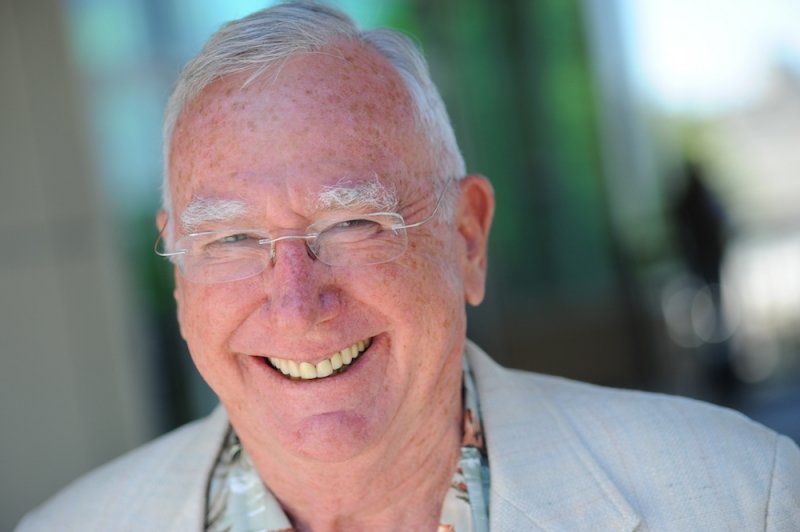Staff Report
 Richard A.M. Dixon just published his eighth book. Courtesy Richard A.M. Dixon
Ted Ralston, Special to KP News
Richard A.M. Dixon just published his eighth book. Courtesy Richard A.M. Dixon
Ted Ralston, Special to KP News
Dick Dixon has eight self-published books under his belt, all historical fiction except two.
Initially drawing on his experiences in the U.S. Army in both war and peace, he has expanded to incorporate sailing, post-apocalyptic survival, the cloak-and-dagger world of French Indochina and Native Alaska Inuit life facing climate change. His latest novel, “Inuit,” follows the harrowing adventures of a Japanese pilot in the U.S. Army.Dixon recently sat down with the KP News to discuss his books and development as a writer.
KP News: Have you always wanted to write?
Dixon: I was always too busy. When I finally retired permanently nine years ago, I decided to write my memoir and some 600 pages later, I found I liked writing.
KP News: What has helped the most in developing your skill as a writer?
Dixon: Travel and experience helped the most. A fair vocabulary is a must. Our writers group helps to air ideas. The biggest “help” is to just sit down and write.
KP News: Do you have a particular approach or process for writing?
Dixon: It usually takes about six months to get to a first draft. I don’t spend a lot of time self-editing this version. At this stage, I start rewriting, eliminating the chaff, looking for stuff that fails to move the story along. I expect to cut the first draft by half and add some new material. By the third and fourth iteration, I have investigated every word. James Michener said, “I’m really not a good writer, but I’m a terrific rewriter.”
KP News: What have you found to be the easiest things to write about? The hardest?
Dixon: The easiest is recalling action, whether wartime or on the ice floes of the Bering Sea, as in my latest novel, “Inuit.” Initially, the Vietnam firefights and Boston childhood skirmishes were hard to write about, but after I forced myself to get them down on paper, this difficulty eased up. The hardest thing for me is to develop depth in female characters. My wife provides input to help overcome this, and so does the writers group I attend at the Key Center library.
KP News: Where do you get your ideas?
Dixon: Experience. I’ve lived and worked over most of the Northern Hemisphere. I’ve tried everything there is; don’t need a bucket list. There really is no substitute for experience.
KP News: How does an aspiring writer get rich and famous?
Dixon: If you want fame and fortune you must throw the dice. You must get an agent, which is an entirely new challenge. If you’re lucky, you’ll find one who will sell your story to a major publisher. If you’re lucky, the book will sell. You have to be lucky. Expect to be overlooked. Think about Herman Melville, author of one of my favorite books, “Moby Dick,” who never sold the book in his lifetime.
KP News: What authors have influenced your writing the most? What books are on your nightstand?
Dixon: Over the years, I’ve always kept four writers close at hand: Ernest Hemingway, Dean Koontz, Kenneth Roberts and James Michener.
KP News: Would you say your stories incorporate any grand ideas or themes?
Dixon: Hemingway taught me that a hero doesn’t necessarily win or take grand chances with fate. Papa’s ideal hero was embodied in “The Old Man and the Sea.” Though he loses and is ultimately beaten down, he gets up and carries on. Mike Dillon of my Dillon’s war trilogy is that sort of character, along with Claude Lellange of “The Tiger of Dien Bien Phu” and Bobbie Jack of “Inuit.” My stories always contain a hero who accomplishes daily tasks and perseveres in the face of debilitating adversity.
 Richard A.M. Dixon just published his eighth book. Courtesy Richard A.M. Dixon
Ted Ralston, Special to KP News
Dick Dixon has eight self-published books under his belt, all historical fiction except two.
Richard A.M. Dixon just published his eighth book. Courtesy Richard A.M. Dixon
Ted Ralston, Special to KP News
Dick Dixon has eight self-published books under his belt, all historical fiction except two.